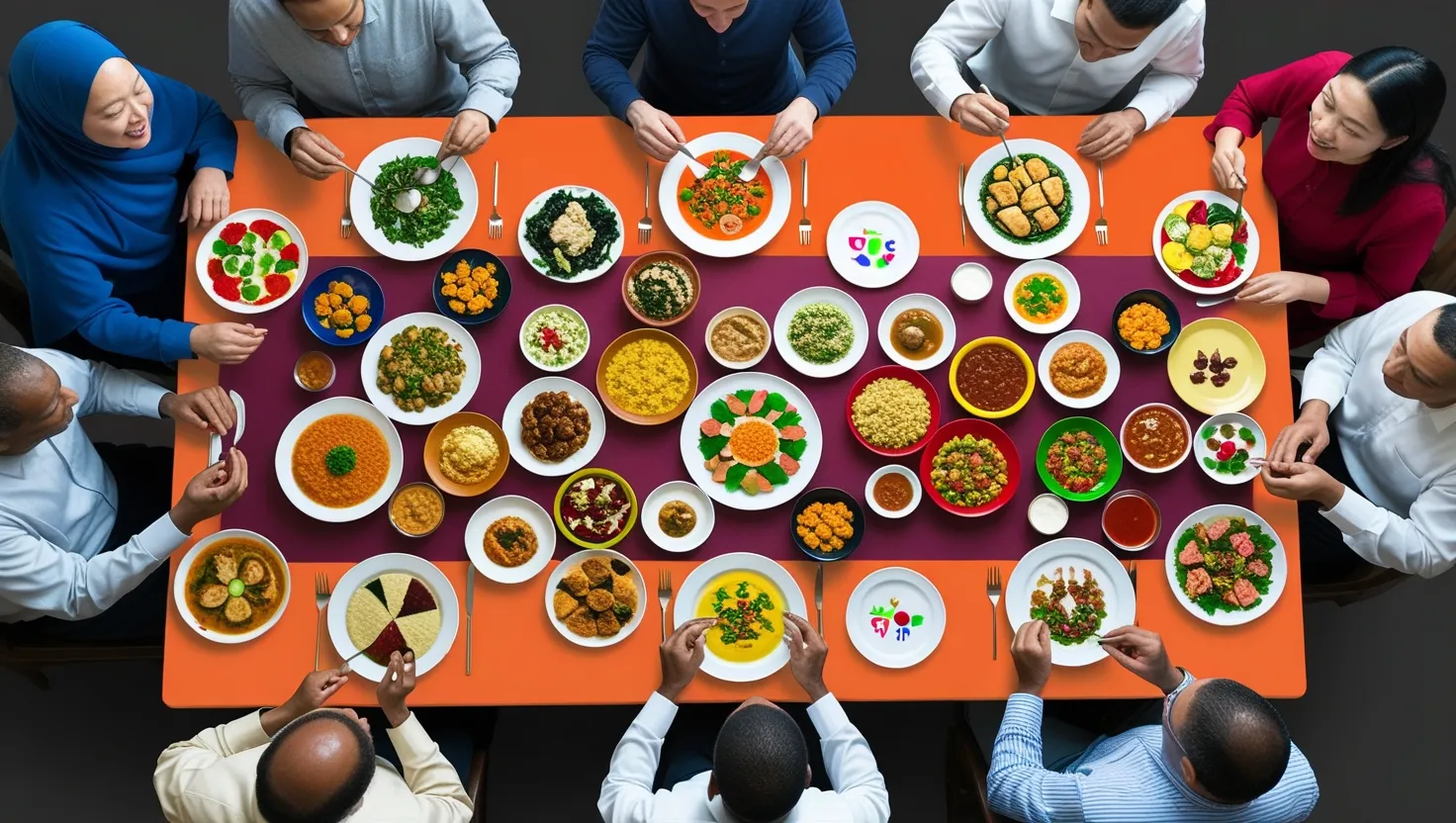When we sit down to a meal, we often don’t think about the complex web of beliefs and traditions that shape what’s on our plate. However, for many people around the world, food is more than just sustenance; it’s a reflection of their spiritual and cultural identity. Let’s delve into the fascinating world of religious dietary laws and their profound impact on food cultures and global markets.
In Judaism, the concept of kosher is more than a set of dietary restrictions; it’s a cornerstone of Jewish identity. The laws of kashrut, which dictate what animals can be eaten and how they must be prepared, are so intricate that they have become a defining feature of Jewish culture. For instance, the prohibition on mixing meat and dairy products has led to the development of separate kitchens and utensils, a practice that has been adopted even in secular Jewish households. This strict adherence to kosher laws has also influenced food production and restaurant practices globally, with many establishments now offering kosher options to cater to the growing demand.
The impact of kosher laws extends beyond the kitchen, too. It has played a crucial role in preserving Jewish identity, especially during times of exile. The story of Daniel, who refused to eat the palace meals in Babylon and instead opted for simple beans and seeds, is a powerful example of how food can be a symbol of resistance against cultural assimilation. This tradition has continued to the present day, with kosher laws serving as a communal bond that strengthens Jewish identity and fosters social cohesion.
In the Islamic world, halal food practices are equally significant. The term “halal” means lawful or permissible, and it encompasses not just dietary restrictions but also the method of animal slaughter and the avoidance of alcohol. Halal food has become a cornerstone of social and cultural identity for Muslims worldwide, influencing food production, distribution, and consumption methods. The global halal market is vast, with many non-Muslim consumers also opting for halal-certified products due to perceptions of higher quality and ethical standards.
Halal food practices have a rich history, dating back to the expansion of the Islamic empire. As Islam spread, local cultural practices were integrated into halal traditions, resulting in diverse culinary practices across regions. Despite colonial pressures and modern challenges, Muslim communities have maintained and adapted these practices as a means of cultural resistance. Today, the halal food industry is a significant player in global trade, with efforts to standardize authorization and regulation ensuring that these dietary practices align with Islamic principles.
In Hinduism, the avoidance of meat, particularly beef, is a common dietary practice. This is rooted in the sacred status of cows in Hindu culture, which has contributed to India’s robust vegetarian cuisine. Many Hindus follow a lacto-vegetarian diet, which excludes meat but allows dairy products. This dietary preference has not only shaped Indian cuisine but has also influenced global vegetarian movements. The innovative use of spices, herbs, and a variety of vegetables in Indian cooking has made vegetarianism appealing to people from diverse backgrounds.
Buddhist traditions also have a significant impact on dietary practices, particularly in the realm of vegetarianism. While not all Buddhists are vegetarians, many follow this diet as a reflection of the principle of non-violence towards all living beings. This has influenced cuisine in many Asian countries, where plant-based diets are common. The spread of Buddhist vegetarianism has contributed to the global trend towards plant-based eating, with many restaurants and food manufacturers now offering vegetarian and vegan options.
Christianity, too, has its own set of dietary traditions, particularly during periods of fasting. Lent, for example, is a 40-day period of fasting and reflection leading up to Easter, during which many Christians abstain from certain foods or reduce their overall food intake. This practice has influenced seasonal eating habits and food traditions in many Christian-majority countries. For instance, the tradition of giving up meat on Fridays during Lent has led to the popularity of fish and seafood dishes on these days.
In Jainism, the dietary laws are perhaps the most stringent. Jains follow a strict vegetarian diet that excludes not only meat but also root vegetables, as these are believed to contain a higher concentration of microorganisms that would be killed during the cooking process. This unique dietary preference has shaped Jain communities’ culinary practices and fostered innovative plant-based cooking techniques. The emphasis on non-violence and minimal harm to living beings has also led to a rich tradition of fruit and vegetable cultivation, contributing to the development of sustainable farming practices.
These religious dietary laws not only shape individual eating habits but also have a profound impact on global markets. The demand for kosher, halal, and vegetarian products has led to the creation of specialized industries that cater to these needs. This has resulted in a more diverse and inclusive food market, where consumers have a wider range of options that align with their religious and cultural beliefs.
Moreover, these dietary practices contribute to diverse culinary traditions worldwide. The exchange of culinary ideas and ingredients across different cultures has enriched global cuisine, making it more vibrant and varied. For instance, the influence of Islamic culinary traditions on Mediterranean and Middle Eastern cuisine is evident in the use of spices, herbs, and cooking methods that originated in these regions.
In addition to their cultural impact, religious dietary laws also have significant health and psychological implications. Adhering to these laws often requires disciplined and conscientious eating habits, which can lead to reduced risks of chronic diseases and enhanced mental well-being. The community and social support that come with following these dietary practices also play a crucial role in reinforcing healthy eating habits and promoting social cohesion.
However, these practices also pose nutritional challenges that necessitate meticulous management and dietary planning. Ensuring that the diet is balanced and nutritious while adhering to religious guidelines can be demanding, especially when dining out or shopping for pre-packaged foods. This requires a deep understanding of the dietary laws and their implications on health, as well as careful scrutiny of food labels to avoid non-compliant ingredients.
In conclusion, religious dietary laws are more than just rules about what to eat and what to avoid; they are a reflection of spiritual and cultural identity. These laws have shaped food cultures, influenced global markets, and contributed to diverse culinary traditions worldwide. As we sit down to our next meal, it’s worth considering the rich tapestry of beliefs and traditions that have brought that food to our table, and the profound impact these laws have on our lives and communities.






